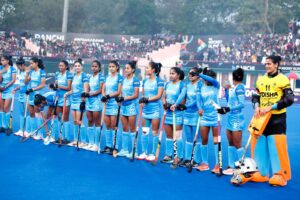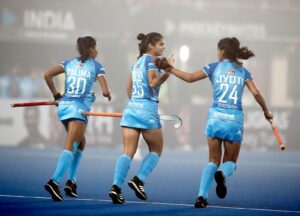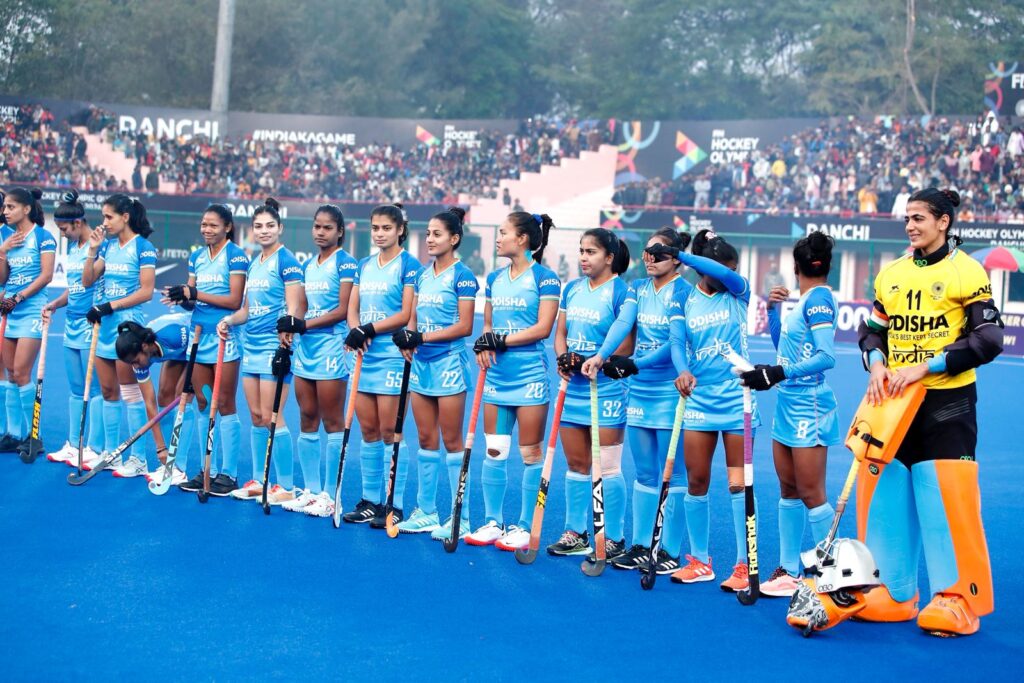
When the Indian men’s hockey team failed to qualify for the 2008 Beijing Olympics, it was considered a tragedy of epic proportions. The country fretted and fumed. Hockey buffs were frustrated and downcast. And with good reason. It was the first time in 80 years, since India made its hockey debut at the Olympics in Amsterdam in 1928, that a country which won eight gold medals failed in the FIH qualifiers. The coach then was Joaquim Carvalho.
Sixteen years hence, the Indian women’s team has failed to make the cut for the Paris Olympics, leading to sadness at home. Get one thing clear, women’s hockey and men’s hockey in India are as different as cheese and chalk. It’s just that after the high of the Tokyo Olympics in 2021, where India finished fourth, this time there was hope that the side captained by Savita Punia and coached by Janneke Schopman would make the grade in Ranchi. They failed.
Yes, India featured in consecutive Olympics, in 2016 and then in Tokyo, but I call this failure a disappointment and a disaster. There was high expectation from this Indian women’s hockey team. When India beat Australia in the Tokyo Olympics quarter-final 1-0, they exceeded expectations and captured the imagination of the country’s sporting public. India then went down fighting to Argentina 1-2 in the semi-finals and came close to winning the bronze medal in a 3-4 verdict against formidable Great Britain. That outstanding, valiant performance, made the nation sit up and take notice. All of a sudden, the women were considered equal to men’s hockey, for the first time. Again, all of a sudden, the team will not be at the Paris Olympics this July. The failure perhaps fuels the notion that Tokyo 2020 was a flash in the pan.
For the Latest Sports News: Click Here
It’s hard being an Indian sports fan! Heartbreaks are routine and yet the fandom is intense!
And they’ll always keep on bleeding blue come what may.
Here’s celebrating our Fans- from football to hockey, cricket, badminton, and more! @ThumsUpOfficial @BoriaMajumdar #CWC23… pic.twitter.com/OvrlSsyr6n
— RevSportz (@RevSportz) January 20, 2024
The Olympic qualifying format was best-suited for India this time. Valencia in Spain and Ranchi involved eight nations. It appeared to be the best format, far less treacherous than earlier ones. In 2008, there were three groups of six nations each in three cities across the globe. It was a league-cum-playoff format. Only the winners qualified. India found themselves along with formidable Great Britain. They lost the league and the play-off final to Great Britain to miss a place for the Beijing Olympics. This time, an eight-team, two-pool format, allowed for three apiece from Valencia and Ranchi to book tickets to Paris. And yet, India missed out.
As regards China, they were unsure of qualifying directly for Paris. Once they beat India in the semi-finals and South Korea in the final at the Asian Games in Hangzhou, effectively booking their tickets, it wasn’t feasible for them to host the qualifying tournament. Hockey India was granted hosting rights for the tournament in Ranchi.
The failure against Japan on Friday has been a huge let-down. When a nation hosts an event, its team is expected to surpass expectations. India failed and reactions of disappointment are justified. This is very much like hockey in Malaysia – good hosts at best! When the Indian women raised the bar, or so one thought, and won the Asian Champions Trophy in Ranchi two months ago, it raised hopes. The big deal at the same venue was the FIH qualifiers, where India flattered to deceive. This was not just one loss, it’s the end of a dream. All up in smoke.
Unlike other European and Asian countries, in India, the state governments of Odisha and Jharkand have spent a lot vis-a-vis infrastructure to support women’s hockey in particular. Of course, the Indian Central government is the biggest supporter, through camps, exposure tours and big-dollar contracts for foreign coaches. Odisha and Jharkand supported women’s hockey because things were looking up for the sport. Looking ahead, the pall of gloom will make it difficult for the promotion of women’s hockey in India.

The growth of the women’s game in the country, matching the men, was exemplary. The Ranchi failure, one fears, will stifle the growth of the women’s game in the country and it could take a decade to regain the attention and glory. When the Indian men’s team failed at the 1982 Asian Games in New Delhi and were thrashed 7-1 by Pakistan, it had a debilitating effect for years. Likewise, memories of Ranchi will be hard to dispel.
Another area which makes it harder for India is that it is no longer easy to garner ranking points in the new system. It takes into account every international match. Previously, only the FIH and continental events were considered. Points are now exchanged for winning and losing (draws yield extra points for a lower-ranked team) according to an algorithm similar to the Elo in chess. India achieved a ranking of No. 6 with a great deal of consistency. It’s galling that the team has become the highest-ranked one not to qualify for Paris.
There are still a lot of shortcomings in women’s hockey. The poor penalty-corner conversion rate, inconsistency, and choking in the semi-finals post-Tokyo 2020 (four out of five occasions) were not rectified. I also wish to make a point about Schopman, the head coach from the Netherlands. She failed to take the USA to the Olympics at the last Olympic qualifier (a one-on-one contest against India in Bhubaneswar). She joined India after that, but failed again. She was bold enough to count on stars like Salima Tete, Deepika Thakur and Sangita Kumari. Not everyone in the fraternity backed her choices, and many didn’t take kindly to the coach “rejecting” established stars like Rani Rampal and Gurjit Kaur.
A cheek-bone injury to ace striker Vandana Katariya compounded matters. After the debacle in Ranchi, the selectors may revert to veterans and rising stars could be sidelined. As regards hockey administration at home, objectivity in analysing defeats has often been absent. The trend of sacking coaches is likely to continue. Coupled with reactions from distraught fans, the profile of women’s hockey has taken a blow and is going to struggle to recover.
India’s failure to qualify for the Olympics is a blow to world hockey as well. The vast Indian fan base is crucial for hockey’s future at the Olympics. Having worked hard over decades to carve out a niche for themselves, women’s hockey often drew crowds. It augured well for the FIH who have set a glittering example in gender equality. The profile of the sport grew globally. Minus India, the Paris Olympics could lose sheen.
Also Read: HS Prannoy turns on beast mode




